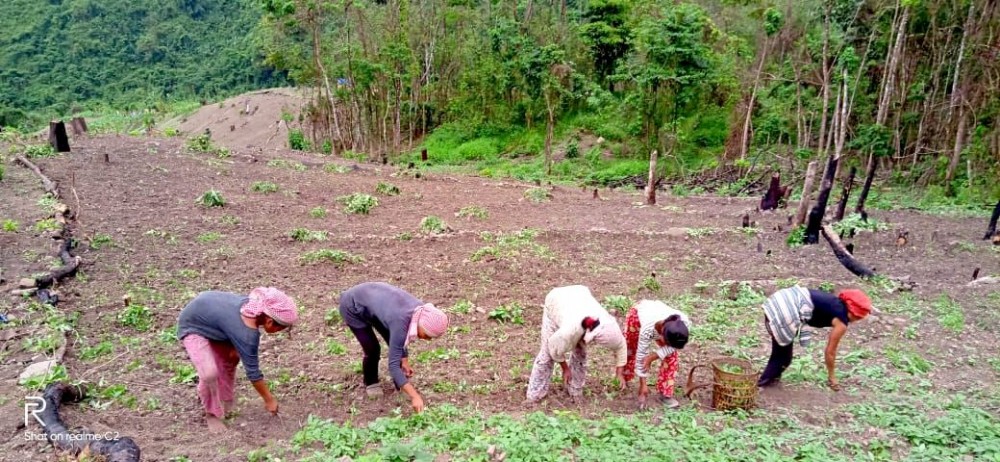Akholu and her family pull weeds in their ginger field in a village in Phek district on May 20. (Morung Photo)

Morung Express News
Dimapur | May 20
As Nagaland weighs the prospects of reopening the economy post the COVID-19 pandemic, Aneyi and his family begin their workdays long before others have sipped their first cup of tea. Walking 3-4 kms every morning with their packed lunches, they begin sowing seeds or paddy, pulling weeds, harvesting fruits and vegetables, collecting snails or foraging forest-based vegetables. By early afternoon, they can rest.
Since the state government allowed farmers to resume agricultural activities on April 7, Aneyi and other farmers from his small village in Phek district have planted garlic, peanuts, beans, brinjal, chillies, ginger, colocasia and a host of other vegetables omnipresent in the Naga kitchen.
When the time comes for harvest, individual farmers will load the few Tata Sumo taxis with these vegetables along with other forest-based vegetables and travel to Phek town to sell them in the daily bazaars. Slipping into the role of street vendors, the profits from this enterprise will provide the farmers with means to fund their children’s education or look into other needs.
With Nagaland Chief Minister Neiphiu Rio stressing on reviving the economy, particularly through agriculture and allied activities in the recent week, things could get better for the farmers in this small nondescript village.
But before that, there is the loss of income brought about by the COVID-19 lockdown.
In the previous agricultural cycle, it became impossible for the farmers to sell their produce as their only mode of transportation remained closed. As a result, most of it were left to rot in the fields or fed to pigs and other livestock. This has left Akholu worried about the future of her children’s education.
With no income in the past two months, Akholu has been contemplating on borrowing money from a Self-Help Group in the village. “I’ll have to put in extra effort in the field and maybe make time to weave a shawl or two in order to pay back the loan but I need to pay their school fees,” she said resolutely.
The vegetables from small villages like Akholu’s and many other villages across the state make their way to ‘urban’ areas of the state after several informal transactions. These ‘supply chains,’ in most places have come to an abrupt halt as a result of the lockdown, causing existential distress to producers, and consumers alike.
Months into the world’s biggest lockdown, Director of Agriculture, M Ben Yanthan is aware of the challenges for all the agriculture and allied sectors. “Changing the mindset and attitude to work in a new environment would therefore be the first challenge for the department,” he told The Morung Express, adding that it also has to take into consideration all agricultural advisories and safety measures.
He viewed that it would mean going back to the drawing board and charting out strategies by involving not only departments but also farmers who have experience and are in the know of traditional farming practices and systems that have sustained farmers.
The Director informed that brainstorming sessions with agricultural officers and stakeholders will be held in order to come out with a healthy working module and a post COVID-19 action plan.
With the aim for farming operations to move towards self sufficiency post COVID-19, he said that the area of focus would include-- micro-economic agriculture development that will enable small and marginal farmers to produce and market food from farm to fork, cluster approaches and organized market linkage both physical and digital platforms, as well as building supply food chain and contract farming by involving local entrepreneurs and Farmer Producer Organizations (FPOs).
Other aspects would include Human Resource Development and skilling of functionaries and farmers in specialized areas, agricultural mechanization and gender friendly tools and equipments for hill agriculture for reducing farm drudgery and to ease farm labour shortage and diversification of agriculture farms into demand driven enterprises.
While the action plan is still in the process, the Director also said that it would work on existing central and state plans and policies in order to identify areas for the department to focus and implement in a suitable manner. This, he hoped, would reaffirm and re-strategize the agriculture sector to achieve food security and prosperity post the pandemic.






